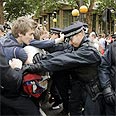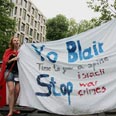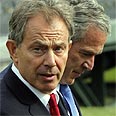
Protestors in London clash with police
Photo: Reuters

Protesting in London (Archive photo)
Photo: AP

Blair (L) and Bush
Photo: AP
Thousands marched through London to demand a halt to the Lebanon war
on Saturday as the British government tried to deflect criticism that it has failed to call for an immediate ceasefire.
Prime Minister Tony Blair's government has come under fire at home for following US President George W. Bush's lead on the conflict between Israel and Lebanese Hizbullah guerrillas and refusing to call for an immediate halt to hostilities.
Thousands of demonstrators marched through central London holding placards reading "End Israeli crimes in Lebanon" and "Freedom for Palestine". Police said around 15,000 people were marching but organizers put the number at more than 100,000.
The Stop the War Coalition, a group formed to oppose the US-led "war on terror" which helped organize the march, urged demonstrators to pile children's shoes near Blair's residence in protest at the death of children in the war.
Marchers will also hand in a petition to Blair urging the government to call for an immediate, unconditional cease-fire.
Despite Blair's decision to delay his holiday to take part in negotiations on a U.N. resolution aimed at stopping the fighting, members of his Labour Party kept up attacks on his stance.
"Our prime minister has failed to represent the country's feelings during the conflict," Mohammad Sarwar, one of a number of Labour legislators calling for parliament to return from its summer break to discuss the crisis, told BBC radio.
Cabinet split denied
Work and Pensions Secretary John Hutton, speaking for the government, denied the cabinet was split and tried to placate critics by saying Blair was making efforts to stop the war.
"The prime minister has made it very clear that the present situation simply cannot continue ... The violence is unacceptable," Hutton told the BBC, adding that Blair was trying to bring the conflict to an end as quickly as possible.
Israel has responded to Hizbullah rocket attacks by pounding Lebanon with devastating air strikes. At least 734 people in Lebanon and 75 Israelis have been killed.
Hutton said London had made clear to Israel that its actions must be proportionate and comply with international law.
Minister and former Foreign Secretary Jack Straw fuelled reports of cabinet divisions last week when he called Israel's bombing of Lebanon "disproportionate". Blair and Foreign Secretary Margaret Beckett have avoided similar language.
A spokesman for Blair said he had talked to UN Secretary-General Kofi Annan on Friday and would make further calls on Saturday. "The prime minister believes progress is being made in New York (at the United Nations)," he said.
Worried by Blair's plunging popularity, some Labour politicians were already urging him to quit sooner rather than later, after he said he would not stand in the next election expected in 2009.
Blair's stance on the Lebanon crisis has further weakened his authority, potentially hastening his departure from office.
In another threat to Blair's Labor Party, The Guardian newspaper reported that relatives of British soldiers killed in Iraq planned to form a new political party to stand against Labour ministers at the next general election.















